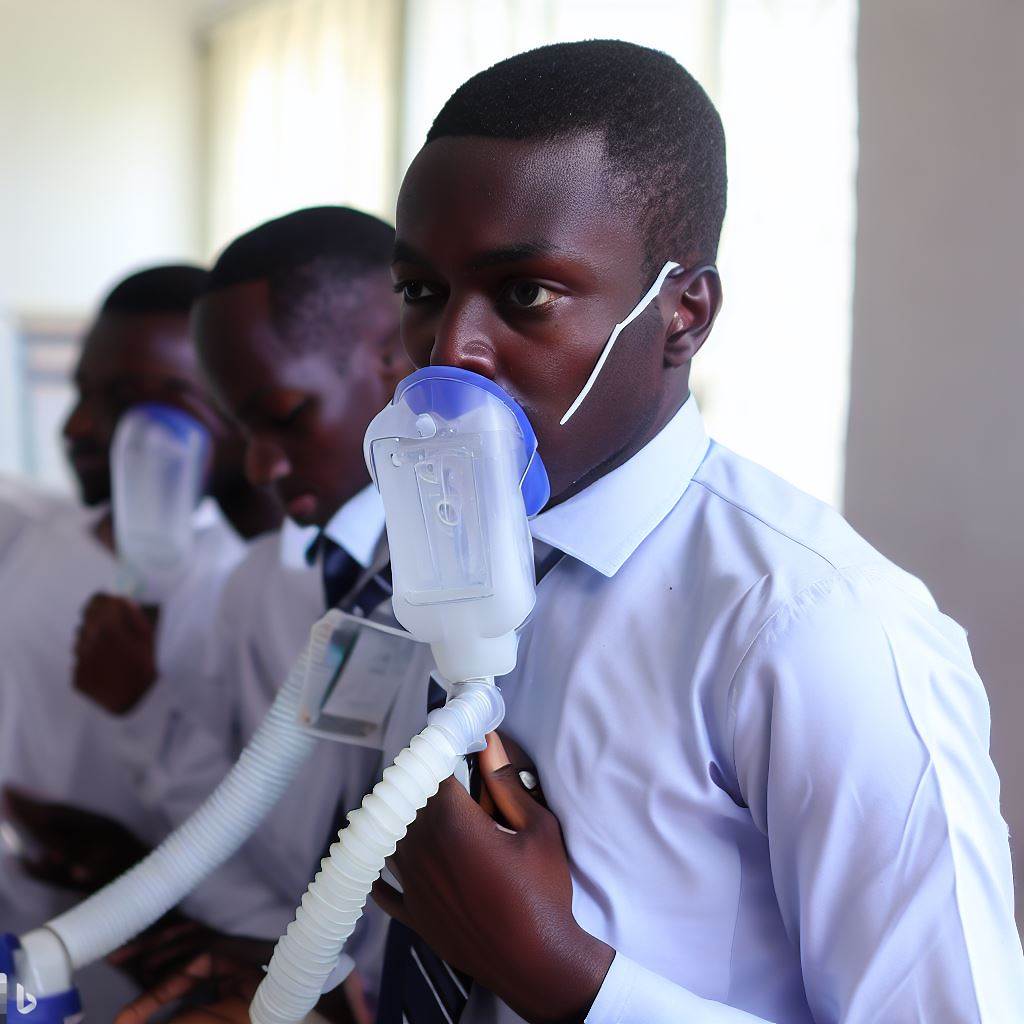Introduction
The respiratory therapy profession in Nigeria is often shrouded in myths and misconceptions.
It is important to demystify these myths to provide accurate information and dispel any misconceptions about the profession.
This blog post will discuss the key points regarding the respiratory therapy profession in Nigeria and why it is essential to understand its true nature.
Importance of demystifying myths
Demystifying myths surrounding the respiratory therapy profession in Nigeria is crucial to create awareness and promote understanding.
By debunking misconceptions, individuals can make informed decisions about pursuing a career in respiratory therapy.
It also helps to bridge the gap in healthcare services by attracting more professionals to this field.
Preview of key points:
- Exploring the role of respiratory therapists in Nigeria’s healthcare system.
- Dispelling the myth that respiratory therapy is a low-skilled profession.
- Highlighting the educational requirements and training necessary to become a respiratory therapist.
- Addressing the misconception that respiratory therapy offers limited career opportunities.
- Discussing the increasing demand for respiratory therapists in Nigeria and their contribution to patient care.
- Providing insights into the daily responsibilities and challenges faced by respiratory therapists in Nigeria.
- Sharing success stories of respiratory therapy professionals in Nigeria to inspire aspiring individuals.
By demystifying these myths, individuals can gain a deeper understanding of the respiratory therapy profession, its importance, and the opportunities it offers in Nigeria.
This blog post aims to provide accurate information and encourage more individuals to consider pursing a career in respiratory therapy, ultimately benefiting the healthcare system and improving patient care.
Myth #1: Lack of Recognition and Awareness
Respiratory therapy in Nigeria often faces underestimation and undervaluation, leading to widespread misconceptions.
Many are unaware of the crucial role respiratory therapists play in healthcare.
Contrary to these myths, recognized institutions support and acknowledge respiratory therapy as an essential profession.
The Nigerian Medical Association (NMA) recognizes respiratory therapists as vital healthcare contributors, assisting physicians and providing critical respiratory care.
The Nigerian Society of Respiratory Therapists (NSRT) is dedicated to advancing and promoting the profession, offering specialized training and certifications.
Success stories like Obinna and Blessing illustrate the positive impact of respiratory therapy, gradually increasing its recognition in Nigeria.
To combat these myths, public education is crucial in highlighting respiratory therapy’s importance.
With support from organizations like NSRT and dedicated professionals, the profession is gaining the recognition it deserves.
Overall, respiratory therapy myths persist in Nigeria, but efforts by institutions and passionate practitioners are challenging these misconceptions and elevating the profession’s status.
Read: Step-by-step Guide to Becoming a Nursing Assistant in Nigeria
Myth #2: Limited Career Opportunities
One prevalent myth surrounding respiratory therapy in Nigeria is the belief in limited career opportunities for aspiring respiratory therapists, which has discouraged potential candidates from pursuing this profession.
However, a closer look at the evolving healthcare landscape reveals a growing demand for respiratory therapists and a wide array of career options available to them.
As Nigeria’s healthcare system adapts to meet the population’s needs, the demand for respiratory therapists is higher than ever.
These professionals play a crucial role in managing respiratory conditions like asthma, COPD, and pneumonia, among others, making their expertise invaluable.
Contrary to the myth, respiratory therapy offers diverse career paths beyond hospitals and clinics.
Respiratory therapists can explore various settings, such as intensive care units, emergency departments, home care, research institutions, educational settings, and even the pharmaceutical industry.
Moreover, respiratory therapy isn’t a dead-end profession; it offers potential for growth and advancement.
Advancements in medical technology and research have expanded their role in diagnostic procedures and protocol development.
Pursuing advanced certifications, like becoming a Registered Respiratory Therapist (RRT), can lead to leadership roles and higher salaries.
Most important, the myth of limited career opportunities in respiratory therapy in Nigeria is unfounded.
This profession presents various avenues for specialization and growth, offering a fulfilling career that significantly impacts both the healthcare system and patients’ lives.
Read: Cultural Competence in Pediatric Care in Nigeria
Myth #3: Misconceptions about Job Scope and Responsibilities
There are several misconceptions surrounding the job scope and responsibilities of respiratory therapists in Nigeria.
These misconceptions often stem from a lack of awareness and understanding of what this profession actually entails.
In this section, we will clarify these misconceptions and shed light on the actual duties and responsibilities of respiratory therapists.
Explanation of the common misconceptions
Misconception 1: Respiratory therapists only assist patients with breathing difficulties
This misconception suggests that respiratory therapists simply help patients who are experiencing breathing difficulties.
However, their scope of work goes beyond this assumption.
Misconception 2: Respiratory therapists cannot handle complex respiratory cases
Some believe that respiratory therapists lack the knowledge and skills to handle complex respiratory cases.
This is far from the truth.
Misconception 3: Respiratory therapists are not part of the healthcare team.
There is a misconception that respiratory therapists are not an integral part of the healthcare team.
In reality, they work closely with doctors and nurses to provide comprehensive care.
Clarification of actual duties and responsibilities
The actual duties and responsibilities of respiratory therapists in Nigeria encompass a wide range of tasks, extending beyond simple assistance with breathing difficulties.
Respiratory therapists are highly skilled professionals who perform diagnostic tests, administer treatments, and provide ongoing care to patients with respiratory conditions.
They specialize in managing respiratory diseases such as asthma, chronic obstructive pulmonary disease (COPD), and pneumonia.
Their responsibilities include assessing patients, conducting pulmonary function tests, analyzing and interpreting test results, creating treatment plans, administering medications, and monitoring patients’ progress.
They also educate patients and their families on self-care techniques and lifestyle modifications to improve respiratory health.
Real-life examples and scenarios
Let’s take a look at some real-life examples and scenarios that showcase the day-to-day tasks and challenges faced by respiratory therapists in Nigeria:
Example 1: Emergency Response
A respiratory therapist is called to the emergency department to assist a patient who is experiencing a severe asthma attack.
They quickly assess the patient’s condition, administer bronchodilators, and monitor the patient’s response to the treatment.
Example 2: Intensive Care Unit (ICU)
In the ICU, a respiratory therapist manages a patient on a mechanical ventilator.
They monitor the patient’s oxygen levels, adjust the ventilator settings, and collaborate with the attending physician to ensure optimal respiratory support.
Example 3: Pulmonary Rehabilitation
A respiratory therapist conducts pulmonary function tests to assess a patient’s lung function and creates an individualized rehabilitation plan.
They guide the patient through exercises, teach breathing techniques, and monitor progress to improve respiratory function.
These examples demonstrate the diverse and crucial role that respiratory therapists play in the healthcare system.
From emergency response to long-term rehabilitation, their expertise and skills are essential in improving the respiratory health of patients.
In fact, it is important to dispel the misconceptions surrounding the job scope and responsibilities of respiratory therapists in Nigeria.
They are highly trained professionals who possess the knowledge and skills to handle various respiratory conditions.
By understanding the true nature of their duties, we can appreciate the invaluable contribution they make to the healthcare field.
Read: Understanding the Nigerian Accent: A Perspective from a Speech Pathologist

Discover More: Nigeria’s Paramedics: Overcoming Adversities in the Line of Duty
Myth #4: Inadequate Training and Skill Development
One prevalent myth surrounding respiratory therapy in Nigeria is the belief that there is insufficient training and skill development for professionals in this field.
However, this notion is far from reality.
Quality education and training programs for respiratory therapy are available in recognized institutions in Nigeria, such as University of Lagos, University of Ibadan, and Covenant University.
These programs encompass vital areas like anatomy, physiology, pharmacology, and patient care, ensuring students’ competence as respiratory therapists.
Continuous professional development holds great importance in the respiratory therapy field.
Respiratory therapists are encouraged to participate in workshops and continuing education programs to stay updated with the latest advancements and ensure top-notch patient care.
Respiratory therapy associations in Nigeria also play a pivotal role in promoting skill enhancement.
They organize conferences, seminars, and training sessions, providing professionals with opportunities to expand their knowledge and stay informed about emerging technologies and best practices.
Additionally, respiratory therapists can pursue advanced certifications and specializations in areas like sleep disorders, pulmonary rehabilitation, and critical care, further validating their expertise and opening new career opportunities.
In review, the myth of inadequate training and skill development in Nigerian respiratory therapy is baseless.
The profession benefits from well-structured educational programs and emphasizes continuous growth, enabling therapists to deliver excellent patient care.
Read: Interview Tips for Aspiring Respiratory Therapists in Nigeria
Myth #5: Lack of Job Security and Growth Potential
One common myth surrounding the respiratory therapy profession in Nigeria is the perceived lack of job security and growth potential.
This misconception can have a significant impact on the career choices of aspiring respiratory therapists.
However, a closer examination of the job market and opportunities in the field suggests otherwise.
Overview of the Job Market and Demand
Contrary to the myth, there is a growing demand for respiratory therapists in Nigeria.
With an increasing prevalence of respiratory diseases and a need for specialized care, respiratory therapists play a crucial role in the healthcare system.
The job market for these professionals is expanding, with hospitals, clinics, and other healthcare facilities actively seeking qualified respiratory therapists to join their teams.
The demand for respiratory therapists is further fueled by factors such as the aging population, air pollution, and the rise of chronic respiratory conditions.
This creates a stable job market with plenty of opportunities for those entering the field.
Read: Top Institutions to Study Phlebotomy in Nigeria
Potential for Professional Growth and Advancement
Another misconception is that respiratory therapy does not offer significant opportunities for professional growth and advancement.
However, this is far from the truth. Respiratory therapists can specialize in various areas such as pediatrics, critical care, sleep medicine, and pulmonary rehabilitation, among others.
By obtaining additional certifications and pursuing advanced education, respiratory therapists can enhance their skills and expertise, opening doors to higher-level positions, leadership roles, and increased job responsibilities.
They can also become educators, researchers, or industry consultants, contributing to the advancement of respiratory care in Nigeria.
Additionally, respiratory therapists can pursue career advancement through professional organizations and networking.
Joining associations such as the Nigerian Society of Respiratory Therapy provides opportunities to connect with peers, access resources for continuous learning, and stay updated with the latest advancements in the field.
These networks can also lead to mentorship opportunities and collaborations.
Dispelling the myth of job insecurity and limited growth potential in the respiratory therapy profession is crucial to encourage aspiring individuals to pursue this rewarding career path in Nigeria.
The job market for respiratory therapists is growing, and there is a demand for their specialized skills.
Furthermore, opportunities for professional growth and advancement exist through specialization, advanced education, and involvement in professional organizations.
It is essential to recognize and embrace these opportunities for a fulfilling and prosperous career in respiratory therapy.
Read: The Salary Structure of Speech-Language Pathologists in Nigeria
Conclusion
This blog post aimed to demystify the myths surrounding the respiratory therapy profession in Nigeria.
We discussed key points such as the importance of respiratory therapists, their scope of practice, and the opportunities for career growth in this field.
For individuals interested in respiratory therapy, we encourage you to explore this profession without being deterred by the myths.
It is a rewarding and fulfilling career that plays a vital role in healthcare.
As a call-to-action, we urge our readers to share this blog post and spread awareness about the realities of the respiratory therapy profession in Nigeria.
By sharing accurate information, we can debunk myths and help more people understand the value of respiratory therapists in our healthcare system.




